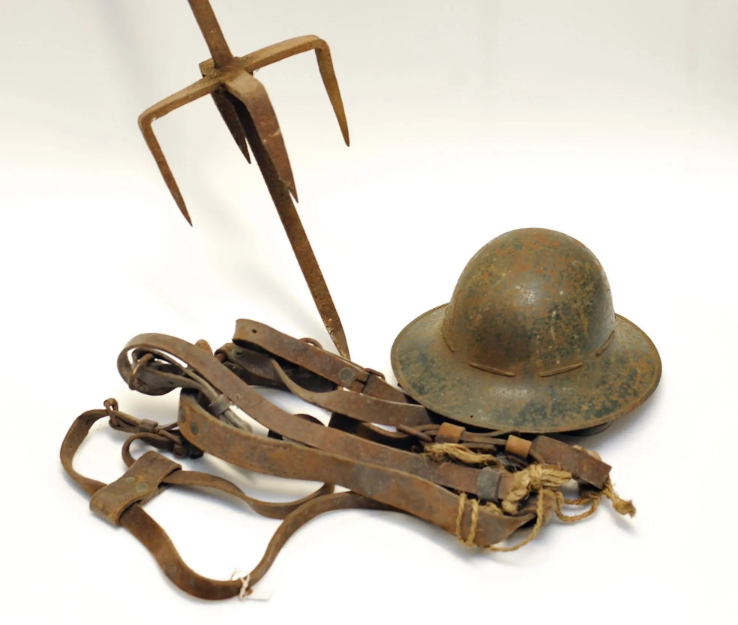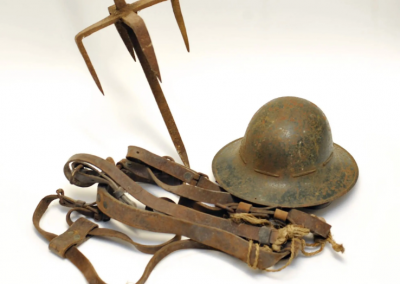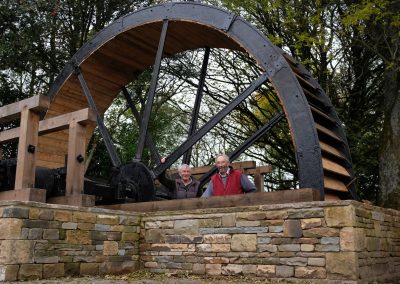Climming Kit for Egg Collecting
Scarborough Museums and Galleries collection
The word ‘climming’ refers to cliff climbing to collect the eggs of seabirds. For hundreds of years, people who lived close to Flamborough Head and Bempton cliffs used to the eggs as food and to sell as an income.
Eggs were needed in the manufacturing of patent leather and also sugar refining.
Climmers were very careful not to take too many eggs to keep the bird population healthy and ensure that their source of food and income could continue.
Exploring the objects
Look carefully at the objects. The metal spike was hammered into the top of the cliff and a very long rope attached to it. One person would use the leather straps as a harness and tie it around their waist and legs. The harness was then attached to the end of the rope.
The metal hat was worn to protect the climmer’s head while they were climbing. The cliffs at Bempton and Flamborough Head are made of chalk, a soft sedimentary rock that is more prone to collapse than harder igneous rocks, making rock falls more likely.
The climmer would then be lowered by four or five other people over the edge to collect the newly-laid eggs on the cliff ledges. Although this kit dates from the early 20th century, it gives us a good insight into the world of climming in the Victorian era too.
The end of climming
Climming was stopped in 1954 when the government passed ‘The Protection of Birds Act’ to protect wild birds. Bird populations had declined due to human activities, including those of some more ruthless egg collectors who did not show the same respect as the climmers, and even because of Victorian shooting parties who saw destroying the eggs and birds as a sport. This is an example of how human behaviour can negatively impact biodiversity in an area.
Bempton Cliffs are now a nature reserve and popular with birdwatchers and tourists. Of the around 31,000km of coastline in the UK, only around 4000km are made up of cliffs.
Why do you think that the metal and leather objects have been kept but equipment like the collecting bags and ropes have not?
Do you think the harness would have been comfortable to wear? What other equipment would you want? (Remember the climmers usually just wore their everyday clothes.)
What dangers do you think the metal helmet would help to protect the climmer from? Do you think it was specially designed for climming, or perhaps for something else before?
The people at the top of the cliff were really important. Who would you choose to dangle you over the cliff? Why?
The climmers didn’t collect every egg. They left some behind. Why was it important to leave some eggs?

Discuss in more depth
If you go to Flamborough Head and Bempton Cliffs today you will find lots of bird watchers. How do you think bird watchers support people who live in the area to make money? What jobs does the bird-watching industry support today?
Why do you think most people today believe that we shouldn’t collect eggs from wild birds? Why do you think people still collect eggs and birds from the wild in some countries?
Vocabulary
Climming: cliff climbing
Climmer: someone who collects eggs from a cliff
Seabirds: birds that live on or near the sea. This includes gulls, gannets and puffins
Biodiversity: the variety of animal and plant life to be found within a particular habitat. A wider variety is considered healthy
Activity – Could you cope as a climmer? Find out if this is the historic job for you
In the Classroom
Hotseat
Interview a student in role as a new recruit to the job of a Victorian climmer! How are they feeling before their first climb? What preparation have they done? What are they most nervous about?
Role play
In pairs or three, role play the scene where more experienced climmers give advice to new recruits to the role! What tips would they share and what would the new climmers want to ask? How might more experienced climmers try to calm the nerves of the new staff?
Use recollections of climming from Flamborough to help you prepare for this task, as shared in an article by the BBC.
Discuss
The Law is not fixed or set, but is changing regularly to meet new conditions. For thousands of years, people collected wild bird eggs in this country, until it was made illegal in 1954. Can you think of any activities today that might be illegal in the future? (You might wish to think about some of the things we do today which are damaging the natural world.)

Hands on History
Today, Bempton Cliffs are an RSPB Nature Reserve and home to Puffins, Gannets, Kittiwakes and Guillemots.
Scarborough Museums and Galleries has a self-led activity for schools to support your students to Draw from Nature. Book access to natural history specimens including seabirds from the local area.
Museum Location
Explore biodiversity and the environment






